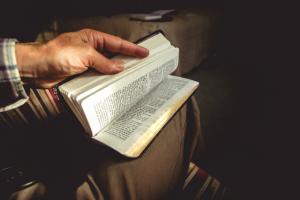Freedom in Christ
Mark 2:23-3:12
In order to warn consumers of potential dangers, many products may include warning labels. But efforts to avoid potential liability can sometimes result in ridiculous-sounding warnings. Here are a few examples found on actual products or in the related manual:
• Ammoniated window cleaner: Do not spray in eyes.
• Electric woodworking drill: This product not intended for use as a dental drill.
• Hair coloring: Do not use as an ice cream topping.
• Sleeping pills: May cause drowsiness.
• Air conditioner: Avoid dropping air conditioners out of windows.
Though many are humorous, product warning labels reflect the impulse of caution in the face of potential danger. In an effort to ensure that behavior pleased God and avoid potential sanction for wrongdoing, the religious leaders developed an oral tradition of sometimes overly detailed religious laws to ensure that people obeyed God’s commands.1
Jesus was all about the business of granting people freedom. His mission was to free people from various things that keep them enslaved:
“The Spirit of the Lord is on me, because he has anointed me to preach good news to the poor. He has sent me to proclaim release to the captives and recovery of sight to the blind, to set free the oppressed, to proclaim the year of the Lord’s favor.” (Luke 4:18–19, CSB)
We learn here in these verses two ways in which we are free:
1. We are free as Christians from the rules and regulations that enslave us (Mark 2:23-28)
Here, Jesus is walking with his disciples and they pick up heads of grain. Strangely, the Pharisees saw the tradition of rest on the Sabbath more important with the reason for the Sabbath.
There are only two requirements for the Sabbath: worship and rest. It is a day set apart for God and family. It is not to be just another secular day, but we are not to look down on each other regarding Sabbath observance. As Paul says in Romans 14:1–15:13, we should respect each other’s religious convictions regarding such things as holy days and food laws.2
The point of the Sabbath is to give us time to rest and to focus our hearts on God. Research shows that we desperately need rest. Consider the following data reported by Key Organization Systems:7
• Nearly one-third of American working adults get less than six hours of sleep per night.
• Sleep deprivation is now costing U.S. companies $63.2 billion a year in lost productivity.
• One-third of employees maintain chronic stress.
The command for keeping the Sabbath is not meant to be a burden but rather is to be viewed as a great gift. When we understand the purpose of the Sabbath, we make it a priority for physical, emotional, and spiritual rest, a rest desperately needed by many in our culture.3
The Pharisees had this idea called the fence. To keep the Sabbath holy, they would not do anything on that day. No work is to be accomplished at all. If one is doing no work, then one is not violating the rule of the Sabbath rest. The letter of the law took priority over the intent of the law. The Sabbath Law’s point was designed as a reminder that everyone needs to rest and give that day to God. That is the intent. The letter of the law would be to do no work whatsoever.
So the Pharisees see the disciples picking grain and they get upset because they are doing something that the Law allows.
“When you enter your neighbor’s standing grain, you may pluck heads of grain with your hand, but do not put a sickle to your neighbor’s grain.” (Deuteronomy 23:25, CSB)
They are just doing it on the Sabbath.
So what happens when one law conflicts with another? The disciples were allowed to eat the grain because Leviticus gives the people permission to pick food from someone’s field. That was lawful. But the Pharisees said it was unlawful because it was on the Sabbath.
Jesus sees their heart and gives them a counter-example:
David and his men who were hungry and went to eat the bread in the Temple.
“He said to them, “Have you never read what David and those who were with him did when he was in need and hungry—how he entered the house of God in the time of Abiathar the high priest and ate the bread of the Presence—which is not lawful for anyone to eat except the priests—and also gave some to his companions?”” (Mark 2:25–26, CSB)
Did Jesus make a mistake when He mentioned Abiathar as the high priest? The record in 1 Samuel 21 names Abimelech, the father of Abiathar (1 Sam. 22:20), as high priest; so our Lord’s words appear to be a contradiction. They are not. It is possible that father and son each had both names (1 Chronicles 18:16 and 24:6; 1 Samuel 22:20 and 2 Samuel 8:17). Also it is likely that our Lord used “Abiathar” to refer to the Old Testament passage about Abiathar rather than to the man. This is the way the Jews identified sections of the Word since their manuscripts did not have chapters and verses such as we have today in our Bibles (see Mark 12:26).4
So eating the showbread was unlawful because it was meant for the priests. But David was allowed to eat it because he need to feed his men. He was doing something necessary and good with what God gave. Jesus tells the Pharisees that the Sabbath is a tool for men. Men are not to be a tool to be used for the Sabbath. We are free from regulations of the Sabbath.
Jesus is declaring that human need always has priority over religious ritual, that the law is fulfilled in love (Matthew 22:37–40).5
2. As Christians, we should use our freedom to benefit God and other people (Mark 3:1-6)
“Jesus entered the synagogue again, and a man was there who had a shriveled hand. In order to accuse him, they were watching him closely to see whether he would heal him on the Sabbath. He told the man with the shriveled hand, “Stand before us.” Then he said to them, “Is it lawful to do good on the Sabbath or to do evil, to save life or to kill?” But they were silent. After looking around at them with anger, he was grieved at the hardness of their hearts and told the man, “Stretch out your hand.” So he stretched it out, and his hand was restored.” (Mark 3:1–5, CSB)
Now, we shift to another scene. Here the Pharisees are watching Jesus to see what He will do next. They still were so caught up in their traditions that they were looking to see how they could trip Jesus up. Jesus points out their hypocrisy and points out the absurdity of their traditions. He asks if it is lawful to do good or to do evil on the Sabbath. Jesus points the Pharisees to the Law because the Pharisees were always pointing to their traditions.
There were many traditions that were used to “keepsake” the Sabbath from being violated. The Pharisees had this rulebook of actions one could or could not take. For example, they would insist that the disciples should starve on the Sabbath because they didn’t take the time to prepare enough food the night before. They would also insist that working on the Sabbath would be in violation of the Sabbath. Jesus is not pitting one Law against another. He is not pointing contradictions in the Old Testament. He is strengthening the intent of the Law by fulfilling it.
Doing good is not to be limited to certain days. The way Jesus phrases the question recalls Deuteronomy 30:15–19: “See, I set before you today life and prosperity, death and destruction.… I have set before you life and death, blessings and curses. Now choose life, so that you and your children may live.” Even on the Sabbath one must make the right choice. Suffering may be alleviated at any time, and to refrain from doing good is to abet evil and to pick death over life.6
His point is that it is better to save someone’s life or do something good on the Sabbath rather than do nothing. That’s the rub when you get legalistic. You start to point out rules and you stop doing service. You start point out people’s problems and you stop helping them with their problems.
This hypocrisy doesn’t go unnoticed by Jesus. He is both angered and grieved that the religious leaders have hardened their hearts.
“After looking around at them with anger, he was grieved at the hardness of their hearts and told the man, “Stretch out your hand.” So he stretched it out, and his hand was restored.” (Mark 3:5, CSB)
Jesus confronts their hardness of heart by continuing with the healing on the Sabbath. The reason He did it was to reveal their inward hate. This confrontation would continue throughout the rest of Jesus’ ministry.
I am sure that many of you had in your class growing up, like I had in my class, a nerd. This particular nerd I’m talking about always made A’s. He studied all the time, was kind of himself, and just always made A’s. Now, there’s nothing wrong with always making A’s. There is nothing wrong with studying all the time. But the problem with these nerds is that they always break the curve. A regular student like me would bank on everyone doing badly on the test so that the teacher would have to grade everyone on the curve. Everyone in the class would benefit from all of the students in the class doing poorly. So it would be OK if I failed. I’d always get a little help from the teacher.
But there was this one guy in class that had to go make an A. This, of course, messed up the curve. The teacher could now argue that all of us students could have studied and done well. So we would get mad at the one person who made an A. Why? Because his success revealed our failure.
The problem with Jesus is that whenever He showed up, He messed up the curve. As long as people could compare themselves with other people, everybody passed. When Jesus showed up, He shows up with all A’s. When He came and revealed the standards of God, it made everybody else see how far they fell short of the Divine Standard.7
The Pharisees and Herodians had been enemies for years. But now the Pharisees, a religious group, and the Herodians, a political party, found themselves united in their opposition to Jesus. This was as unlikely as seeing the Pro-Choice and Pro-Life movements saying, “Let’s join forces.”8
But like the saying goes: “the enemy of my enemy is my friend.”
This reveals more about the opponents than it does about Jesus or what is permissible on the Sabbath.9
3. My Christian freedom may encounter opposition. Yet, it shouldn’t stop me from doing ministry to others (Mark 3:7-12)
“Jesus departed with his disciples to the sea, and a large crowd followed from Galilee, and a large crowd followed from Judea, Jerusalem, Idumea, beyond the Jordan, and around Tyre and Sidon. The large crowd came to him because they heard about everything he was doing.” (Mark 3:7–8, CSB)
The last point I want you to notice is that the opposition that Jesus encountered here didn’t stop Him from continuing His work. He had to adapt to it. He had to go to a different location. But He didn’t stop healing. He didn’t stop helping. He didn’t stop reaching out to others. He continued. So should we.
1 Grant R. Osborne, Mark, ed. Mark L. Strauss and John H. Walton, Teach the Text Commentary Series (Grand Rapids, MI: Baker Books, 2014), 53.
2 Grant R. Osborne, Mark, ed. Mark L. Strauss and John H. Walton, Teach the Text Commentary Series (Grand Rapids, MI: Baker Books, 2014), 52.
3 Grant R. Osborne, Mark, ed. Mark L. Strauss and John H. Walton, Teach the Text Commentary Series (Grand Rapids, MI: Baker Books, 2014), 53.
4 Warren W. Wiersbe, The Bible Exposition Commentary, vol. 1 (Wheaton, IL: Victor Books, 1996), 118.
5 Jon Courson, Jon Courson’s Application Commentary (Nashville, TN: Thomas Nelson, 2003), 233.
6 David E. Garland, Mark, The NIV Application Commentary (Grand Rapids, MI: Zondervan Publishing House, 1996), 109.
7 Tony Evans, Tony Evans’ Book of Illustrations: Stories, Quotes, and Anecdotes from More than 30 Years of Preaching and Public Speaking (Chicago, IL: Moody Publishers, 2009), 171.
8 Jon Courson, Jon Courson’s Application Commentary (Nashville, TN: Thomas Nelson, 2003), 233–234.
9 David E. Garland, Mark, The NIV Application Commentary (Grand Rapids, MI: Zondervan Publishing House, 1996), 108.
Photo by James Coleman on Unsplash
Other Posts:
Christian Freedom, Denominational Walls, and Offending Others














